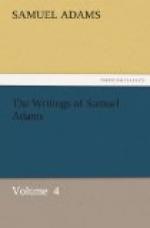it is not long since the subject of elections was
under the consideration of the Legislature, and a
law passed for the purpose of further security to
the people in the free exercise of this invaluable
right; yet give me leave to suggest for your consideration,
whether still further securities may not be provided,
so that the rightful electors may not be frustrated
in their honest intentions. That elections may
not be contaminated by strangers, or unqualified persons,
may it not be necessary that every man may be known,
as far as possible, when he presents himself to give
his vote; this may be more especially important in
our seaports and other populous towns, in which many
foreigners of all sorts frequently reside. I would
be far from dictating to you, but I would submit to
your judgment whether, considering the liberality
of this country to foreigners, and the frequency of
their naturalizations, it may not be eligible that
such foreigners should be required when they offer
their votes to the Selectmen of the towns, to produce
authentic certificates from the Courts, by which they
were endowed with so high a privilege, as a test of
their citizenship. As Piety, Religion and Morality
have a happy influence on the minds of men, in their
public as well as private transactions, you will not
think it unseasonable, although I have frequently
done it, to bring to your remembrance the great importance
of encouraging our University, town schools, and other
seminaries of education, that our children and youth
while they are engaged in the pursuit of useful science,
may have their minds impressed with a strong sense
of the duties they owe to their God, their instructors
and each other, so that when they arrive to a state
of manhood, and take a part in any public transactions,
their hearts having been deeply impressed in the course
of their education with the moral feelings—such
feelings may continue and have their due weight through
the whole of their future lives.
Permit me to call your attention to the subject of
the Militia of the Commonwealth.—A well
regulated militia “held in an exact subordination
to the civil authority and governed by it,”
is the most safe de fence of a Republic.—In
our Declaration of Rights, which expresses the sentiments
of the people, the people have a right to keep and
bear arms for the common defence. The more generally
therefore they are called out to be disciplined, the
stronger is our security. No man I should think,
who possesses a true republican spirit, would decline
to rank with his fellow-citizens, on the fancied idea
of a superiority in circumstances: This might
tend to introduce fatal distinctions in our country.
We can all remember the time when our militia, far
from being disciplined, as they are at present, kept
a well appointed hostile army for a considerable time
confined to the capital; and when they ventured out,
indeed they took possession of the ground they aimed
at, yet they ventured to their cost, and never forgot




